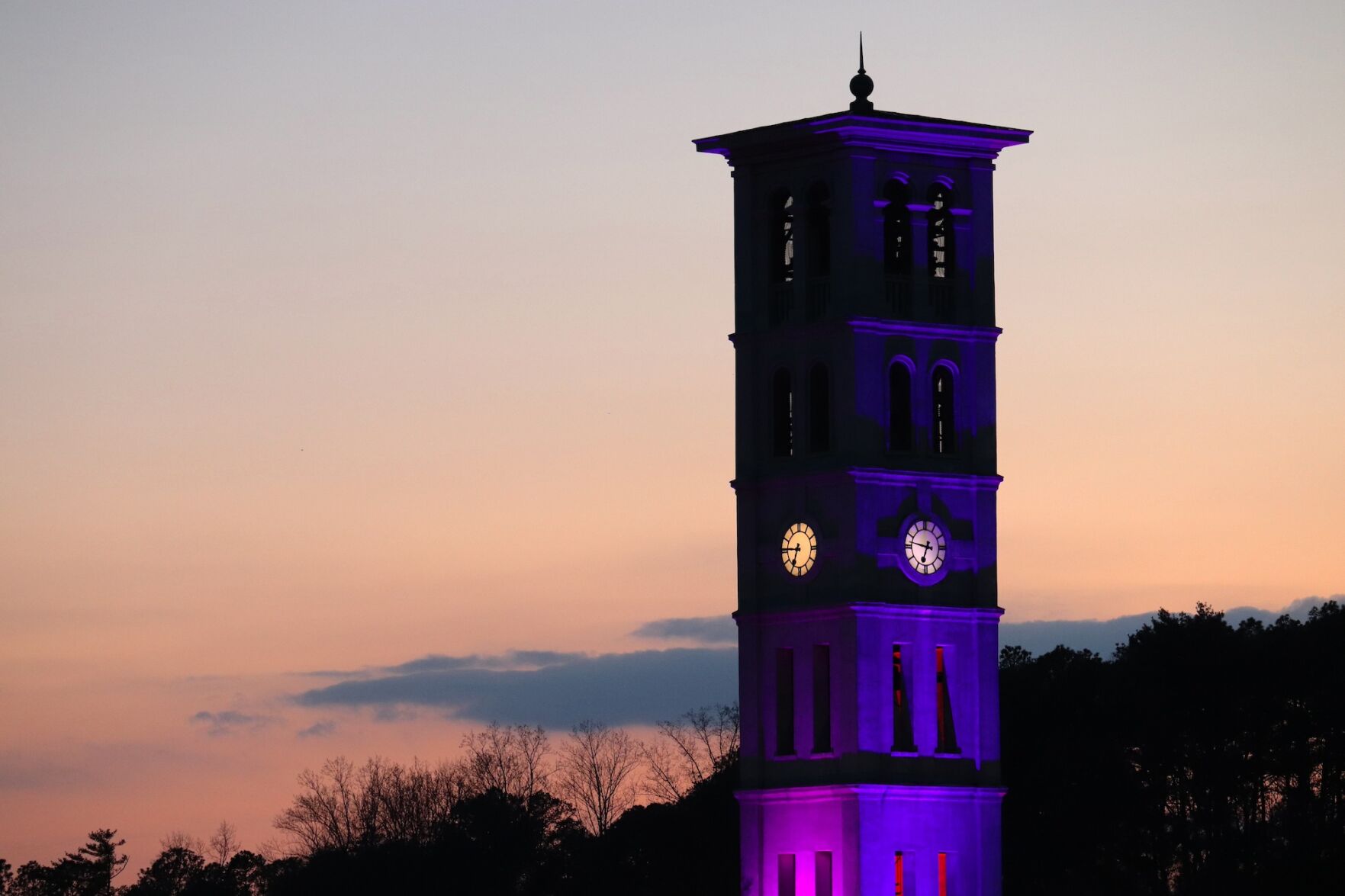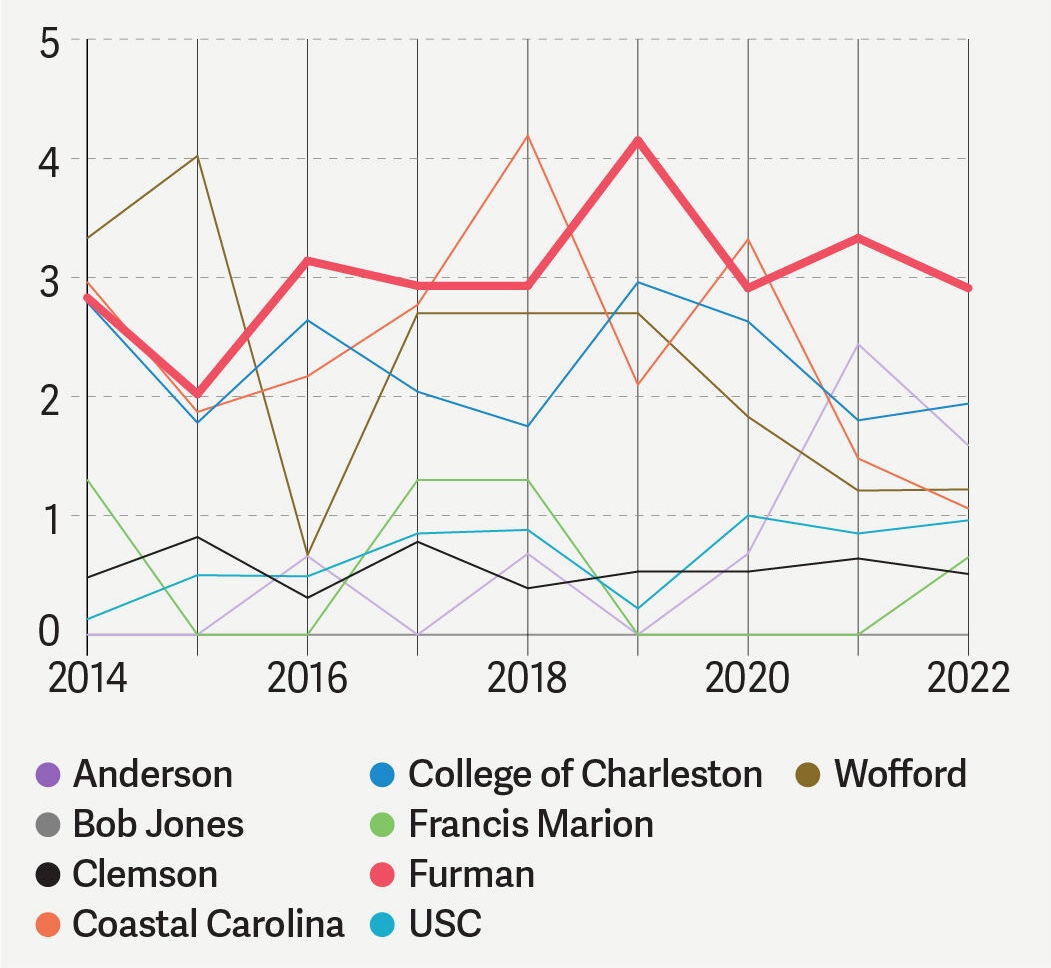 The Bell Tower on Furman University's campus. Two lawsuits against Furman come as the university and other small South Carolina colleges have regularly reported more rapes per capita in its dormitories than larger universities in the state, relative to the number of students who can live on campus at each school.David Ferrara
The Bell Tower on Furman University's campus. Two lawsuits against Furman come as the university and other small South Carolina colleges have regularly reported more rapes per capita in its dormitories than larger universities in the state, relative to the number of students who can live on campus at each school.David Ferrara
2 women say they were sexually assaulted at Furman and chose to sue. They're not alone.
March 5, 2024GREENVILLE — A Bob Jones University student said she was invited to a football player's party on Furman University's campus. At the party, she claimed she was drugged and then sexually assaulted.
Another woman said she went to a fraternity party underage and left after drinking a lot of alcohol. Later that night, she said one of the fraternity members came to her dorm, more alcohol in hand, and forcibly advanced on her despite her refusals.
In two lawsuits filed in 2020 and 2023, respectively, both women made the decision to sue Furman, in addition to their alleged assaulters, for what they describe as the school's role in failing to prevent their sexual assaults.
Furman has led the state's major universities in reported rapes per capita in campus dorms several times in recent years, according to an analysis of Clery Act disclosures by The Post and Courier.
The Clery Act requires all colleges and universities receiving federal funding to publish an annual security report with statistics of crime occurring on campus. In 2014, the Violence Against Women Act defined rape as a distinct category of sexual assaults under the Clery Act.
Since then, Furman and other small South Carolina universities have regularly reported more rapes per capita in their dormitories than larger universities in the state, relative to the number of students who can live on campus at each school.
 REPORTED SEXUAL ASSAULTS AT FURMAN LEAD SOUTH CAROLINA PER CAPITA: Since 2014, Furman University's Clery disclosures show a high number of sexual assaults reported on campus when compared with the on-campus populations of other major universities in South Carolina. (Source: Clery reports; U.S. Dept. of Education)Brandon Lockett, The Post and Courier
REPORTED SEXUAL ASSAULTS AT FURMAN LEAD SOUTH CAROLINA PER CAPITA: Since 2014, Furman University's Clery disclosures show a high number of sexual assaults reported on campus when compared with the on-campus populations of other major universities in South Carolina. (Source: Clery reports; U.S. Dept. of Education)Brandon Lockett, The Post and Courier
The university said the number is a reflection of its efforts toward encouraging women to come forward and report.
In 2023, Furman, with 2,407 beds, reported seven rapes on campus — more than the College of Charleston, Clemson University and Coastal Carolina University.
The University of South Carolina, with 9,377 beds, reported nine rapes on campus, and Clemson, with 7,800 beds, reported four rapes on campus.
Coastal Carolina University and Wofford College are the only other South Carolina colleges that have reported more rapes per capita than Furman in 2014, 2015, 2018 and 2020.
Bob Jones University has not reported a single rape on campus since 2014, according to its Clery disclosures.
Furman credits a ‘reporting culture' among its 2,000 students
Furman credited its fostering of a "reporting culture" that helps to prevent sexual assaults and provide students with the resources they need as the reason why they have higher numbers than other schools.
"Because we have such a robust and extensive Title IX reporting system, including counting incidents that other universities in the country might not, our data might be more complete than other schools," said Melissa Nichols, Furman's Title IX coordinator.
Each university, including Furman, said in their Clery disclosures that they follow the same Uniform Crime Reporting procedure released by the Federal Bureau of Investigation.
Furman said higher numbers might also be from it removing barriers to reporting, like making almost all of its employees mandated reporters, providing educational awareness programming and giving students choices of how to proceed when reporting an incident.
"We are confident that our students are listened to and cared for," Nichols said.
Sexual assault is prevalent on college campuses nationally, and building a good reporting structure that considers each case uniquely has been a priority for Furman, Nichols said.
Clemson and the University of South Carolina consistently report the least number of rapes relative to the number of students living on campus at each school.
Smaller universities like Wofford College and Anderson University reported higher numbers of rapes per capita compared with major universities.
Population density could also be part of the reason, since smaller schools like Furman have more students on campus compared to schools like Clemson, where more than half of students live in the surrounding area, Clemson spokesman Phillip Sikes told The Post and Courier.
When asked about barriers to reporting at Bob Jones University, such as students getting in trouble for their actions during an assault, a school spokeswoman said the school responds to incidents based on the specific facts of the situation.
"Our students choose to attend because of the moral and religious positions of the University. They voluntarily agree to abide by the Student Handbook," spokeswoman Courtney Montgomery said.
Lawsuits claim Furman motivated by ‘unreasonable financial gain'
Both lawsuits are being led by one Greenville law firm, Hawkins and Jedziniak. In each, the women claimed that Furman was motivated by "unreasonable financial gain," such that the school knew what was going on but did not take the proper precautions to prevent it.
The Post and Courier generally doesn't name victims of alleged sexual assault.
Attorneys for the firm didn't respond to calls and emails from The Post and Courier for comment.
In court filings, the university has broadly denied all allegations of wrongdoing. Both lawsuits are awaiting trial.
In the 2020 suit, the woman alleged that Furman knew, or should have known, about a culture on the football team of players regularly getting females intoxicated before sexually assaulting them.
 Furman announced in 2019 it would no longer allow Greek houses off-campus and has since dedicated space to fraternities and sororities in the Clark Murphy complex.David Ferrara
Furman announced in 2019 it would no longer allow Greek houses off-campus and has since dedicated space to fraternities and sororities in the Clark Murphy complex.David Ferrara
The woman said she was drugged by a football player in his apartment and that she called Furman University police to report the incident that night.
When officers arrived, the woman said she told them she was worried she would get expelled from Bob Jones University if officials there learned she had drank alcohol that night.
The officer then called Bob Jones and told them that the woman was drunk on Furman's campus, which resulted in her expulsion from the university hours later, according to the lawsuit.
The 2023 lawsuit centers on Furman's Beta Theta Pi fraternity. The woman said one of the members of the fraternity sexually assaulted her after she became intoxicated at a fraternity party and was unable to give consent. She was underage at the time.
A spokesman for Beta Theta Pi declined to comment on the lawsuit but said it takes all reported incidents seriously, working with its chapters, universities and law enforcement to conduct investigations and take action.
"Beta places the highest priority on promoting a healthy and safe environment for members and guests, and on matters related to sexual assault strives to respect victims and address incidents so as to make clear that such behavior has no place in the brotherhood," spokesman Justin Warren said.
Greenville firm has met Furman in the courtroom before
In addition to the two outstanding sexual assault suits, Hawkins and Jedziniak settled a 2018 lawsuit with Furman relating to another alleged sexual assault by a member of the Beta Theta Pi fraternity.
The lawsuit claimed that Furman violated its own sexual misconduct policy and Title IX mandates when the university investigated the assault.
Attorneys argued that the woman's medical records were improperly sent to the alleged assaulter's lawyers, allowing them to obtain an expert witness to dispute them, and that the process took over six months instead of 60 days under the university's policy, according to the suit.
The woman was "socially ostracized" for initiating an investigation against a member of the fraternity, the lawsuit said.
The suit was resolved with all of the legal claims dismissed and allegations dropped, according to Furman spokesman Clinton Colmenares. No settlement was made and no money was paid out, Colmenares said.
Since then, Furman has made efforts to adjust the fraternity culture on its campus.
In 2019, the university announced it would no longer allow fraternities to have their own houses, citing a response to increased calls for institutions to have "greater oversight" over Greek life.
And after South Carolina passed its Tucker Hipps transparency law for fraternity and sorority organizations at public universities, Furman made the decision as a private university to publish similar reports of violations.